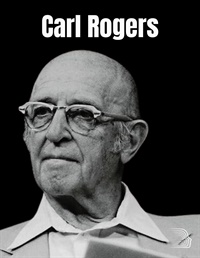
- Average Rating:
- Not yet rated
- Topic Areas:
- Carl Rogers
- Categories:
- GMA Season One | Grandmasters' Approaches
- Faculty:
- Jeffrey Zeig, PhD
- Course Levels:
- Master Degree or Higher in Health-Related Field
- Duration:
- 30:51
- Format:
- Audio and Video
- Original Program Date:
- Jul 18, 2023
- Short Description:
- If our futures are informed by our pasts, what do we stand to learn from those masters who came before us? In the Grandmasters' Approaches to Psychotherapy, Dr. Jeffrey Zeig will be your tour guide in exploring the wisdom and exceptional insights of some of the brightest minds to ever grace the field of psychotherapy. These in-depth lectures cover the most vital elements of their individual styles, and will bring them all together to reveal what learnings we can take away in our modern practice.
- Price:
- $29.00 - Base Price
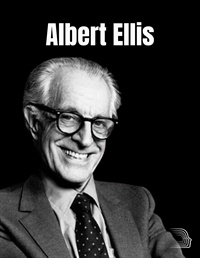
- Average Rating:
- Not yet rated
- Topic Areas:
- Albert Ellis
- Categories:
- GMA Season One | Grandmasters' Approaches
- Faculty:
- Jeffrey Zeig, PhD
- Course Levels:
- Master Degree or Higher in Health-Related Field
- Duration:
- 33:08
- Format:
- Audio and Video
- Original Program Date:
- Jul 18, 2023
- Short Description:
- If our futures are informed by our pasts, what do we stand to learn from those masters who came before us? In the Grandmasters' Approaches to Psychotherapy, Dr. Jeffrey Zeig will be your tour guide in exploring the wisdom and exceptional insights of some of the brightest minds to ever grace the field of psychotherapy. These in-depth lectures cover the most vital elements of their individual styles, and will bring them all together to reveal what learnings we can take away in our modern practice.
- Price:
- $29.00 - Base Price
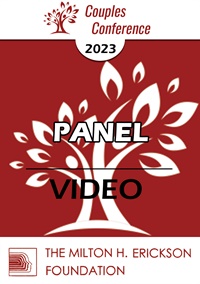
- Average Rating:
- Not yet rated
- Topic Areas:
- Keynotes
- Bundle:
- Couples Conference 2023
- Categories:
- Couples Conference | Couples Conference 2023
- Faculty:
- Martha Kauppi, MS MFT | Ellyn Bader, PhD | Lori Weisman, MA | Cristine Toel, LPC
- Course Levels:
- Master Degree or Higher in Health-Related Field
- Duration:
- 59:32
- Format:
- Audio and Video
- Original Program Date:
- May 07, 2023
- Short Description:
- Infidelity erodes trust and can destroy relationships. Traumatic effects can be addressed.
- Price:
- $59.00 - Base Price

CC23 Panel 03 - Forgiveness - Frank Anderson, MD; Joseph Winn, MSW, LICSW, CST-S; Cristine Toel, LPC
- Average Rating:
- Not yet rated
- Topic Areas:
- Keynotes
- Bundle:
- Couples Conference 2023
- Categories:
- Couples Conference | Couples Conference 2023
- Faculty:
- Frank Anderson, MD | Joseph Winn, MSW, LICSW, CST-S | Cristine Toel, LPC
- Course Levels:
- Master Degree or Higher in Health-Related Field
- Duration:
- 1:00:39
- Format:
- Audio and Video
- Original Program Date:
- May 07, 2023
- Short Description:
- Forgiveness can heal relationship ruptures. Procedures for addressing forgiveness will be offered. Attendees can learn methods of working to promote forgiveness.
- Price:
- $59.00 - Base Price
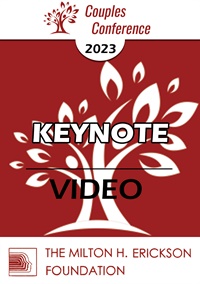
- Average Rating:
- Not yet rated
- Topic Areas:
- Keynotes
- Bundle:
- Couples Conference 2023
- Categories:
- Couples Conference | Couples Conference 2023
- Faculty:
- Stan Tatkin, PsyD, MFT
- Course Levels:
- Master Degree or Higher in Health-Related Field
- Duration:
- 57:10
- Format:
- Audio and Video
- Original Program Date:
- May 07, 2023
- Short Description:
- A psychobiological approach to couple therapy (PACT) is, at is core, a social-justice, purpose-centered approach to primary attachment relationships (two or more). That is to say, PACT therapists expect their partnership clients to become secure functioning. A secure-functioning system is one that is a two (or more) psychological system grounded in fairness, justice, mutual sensitivity, collaboration, and cooperation. In other words, secure functioning relationship is a team sport. For many, secure functioning is a high bar to achieve. It requires a degree of social-emotional development, moral reasoning, individuation, differentiation, self-activation, and of course interest in, and a willingness to pursue it as a goal.
- Price:
- $59.00 - Base Price
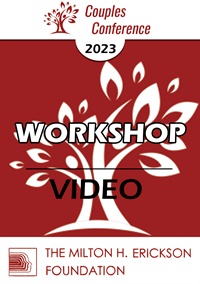
- Average Rating:
- Not yet rated
- Topic Areas:
- Workshops
- Bundle:
- Couples Conference 2023
- Categories:
- Couples Conference | Couples Conference 2023
- Faculty:
- Elliott Connie, MA, LPC
- Course Levels:
- Master Degree or Higher in Health-Related Field
- Duration:
- 2:02:15
- Format:
- Audio and Video
- Original Program Date:
- May 07, 2023
- Short Description:
- Couples come to therapy with a myriad of complications, things like infidelity or communication issue are common issues that bring people into our offices. Managing these issues can be tricky and conducting a session that leads towards change can be even trickier. There is often a strong temptation to try to “teach” the couple how to function. However, we have to resist this urge because it doesn’t work nor does it lead towards change. In this workshop I am going to show you how to use the Solution Focused Approach to help couples create positive change in their relationship, regardless of the referral issue.
- Price:
- $59.00 - Base Price

- Average Rating:
- Not yet rated
- Topic Areas:
- Workshops
- Bundle:
- Couples Conference 2023
- Categories:
- Couples Conference | Couples Conference 2023
- Faculty:
- Lori Weisman, MA
- Course Levels:
- Master Degree or Higher in Health-Related Field
- Duration:
- 2:00:17
- Format:
- Audio and Video
- Original Program Date:
- May 07, 2023
- Short Description:
- Demand is growing for couples intensives. If you have been curious about intensives but weren’t sure how to lead them this workshop is you. There is a therapy process that gives you all the time in the world to provide your clients with the foundation they need to communicate effectively, without being interrupted by weekly breakdowns. This format gives you time to work on the real issues. Time to practice new skills couples can rely on for life. Time to see and disrupt the exact patterns clients are desperate to change. We’ll also review how to discern which couples will benefit from an intensive model. You will see a demonstration of how to talk to your existing clients about doing an intensive with you.
- Price:
- $59.00 - Base Price
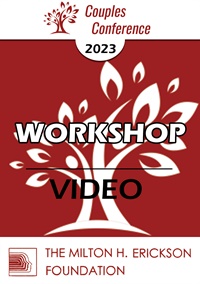
- Average Rating:
- Not yet rated
- Topic Areas:
- Workshops
- Bundle:
- Couples Conference 2023
- Categories:
- Couples Conference | Couples Conference 2023
- Faculty:
- Joseph Winn, MSW, LICSW, CST-S
- Course Levels:
- Master Degree or Higher in Health-Related Field
- Duration:
- 2:04:44
- Format:
- Audio and Video
- Original Program Date:
- May 07, 2023
- Short Description:
- This workshop will provide participants with an integrated theoretical framework, e.g., sociological, systemic, somatic, and psychodynamic, to the assessment, formulation, and treatment of trauma within relational therapy. This presentation will focus on the everyday use of witnessing, movement, and art to engage self-soothing, connection, and the re-engagement of voice, touch, and healing in relational therapy.
- Price:
- $59.00 - Base Price
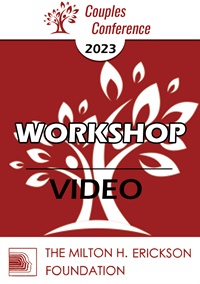
- Average Rating:
- Not yet rated
- Topic Areas:
- Workshops
- Bundle:
- Couples Conference 2023
- Categories:
- Couples Conference | Couples Conference 2023
- Faculty:
- Stan Tatkin, PsyD, MFT
- Course Levels:
- Master Degree or Higher in Health-Related Field
- Duration:
- 2:12:51
- Format:
- Audio and Video
- Original Program Date:
- May 06, 2023
- Short Description:
- This two-hour workshop will demonstrate how to organize and approach partner betrayal. In this case, the secret-keeper has kept vital information from the discovery-partner – such as a love affair, sexual acting out, financial decisions, a secret life, and other instances where the secret-keeper withheld, lied, and used gaslighting to cover their tracks. The reveal or discovery of important information that, if previously known, would have changed everything, is arguably the most devastating form of betrayal in romantic relationships. The discovery partner almost always exhibits PTSD symptoms of mood instability, sleep problems, flash backs, intrusive and obsessive thoughts, paranoia, and abandonment depression. A specific therapeutic architecture and therapist stance is vital to a successful therapeutic outcome of secure functioning. Attendees will learn how to approach this unidirectional betrayal structure through and video example.
- Price:
- $59.00 - Base Price
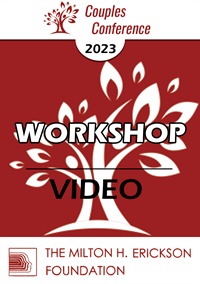
- Average Rating:
- Not yet rated
- Topic Areas:
- Workshops
- Bundle:
- Couples Conference 2023
- Categories:
- Couples Conference | Couples Conference 2023
- Faculty:
- Cristine Toel, LPC
- Course Levels:
- Master Degree or Higher in Health-Related Field
- Duration:
- 2:00:29
- Format:
- Audio and Video
- Original Program Date:
- May 06, 2023
- Short Description:
- This workshop will provide participants with an understanding of how the Adaptive Information Processing Model (including the three-pronged protocol and 8 phases of EMDR) is applied for the treatment of relational trauma for the betrayer and the betrayed partner within the context of an intensive therapy model, provided by a therapeutic team system at Psychological Counseling Services, Ltd. (PCS). This presentation will focus on the implementation of EMDR that is focused on assisting the healing of the couple using Standard Protocol EMDR, EMDR addiction protocols, internal family systems EMDR, and couple’s shared EMDR.
- Price:
- $59.00 - Base Price
Please wait ...

